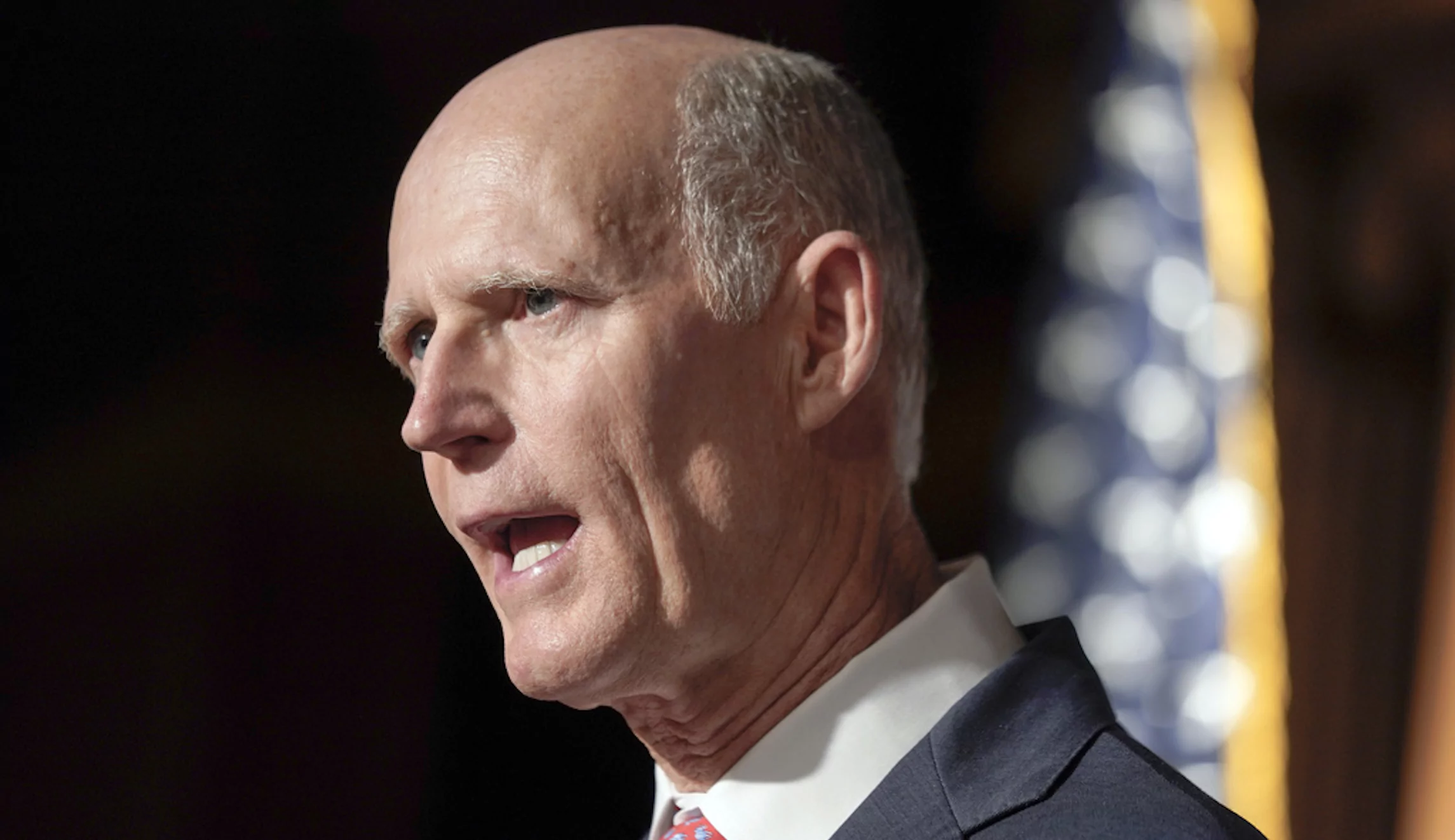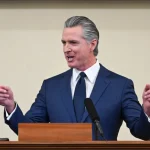

Sen. Rick Scott (R-FL) will return to a far more friendly Washington next year as two of his biggest enemies step aside in a historic transfer of power.
Senate Minority Leader Mitch McConnell (R-KY) is retiring from leadership in January, ending an 18-year tenure that Scott has compared to a dictatorship. Scott will have a friendlier occupant in the White House, too.
President Joe Biden spent a year of his presidency trying to make Scott the poster child for cutting entitlements. Now Biden is quietly serving out his final days in office before President-elect Donald Trump takes his place.
The change of circumstance is entirely foreign for Scott, who rose to national prominence with an anti-establishment message that challenged McConnell’s leadership. He fought over everything from campaign strategy to how the Senate is run.
But Scott will have a fresh chance next year to translate his conservative credentials into actual policy. Last week, he lost a run to become the next majority leader, but Senate Minority Whip John Thune (R-SD), the winner of that race, has extended an olive branch with promises to democratize how the chamber operates.
“I think that means I’ll have a better shot at trying to get things I want done. Trump will have a better shot at getting things he wants done,” Scott said in an interview with the Washington Examiner.
“So I think it’ll be a place where we all can work and feel like we all are part of something,” he added.
‘Somebody’s got to lead’
Taken together, Scott, who just won reelection to a second term, is slated to be one of the more influential conservatives as Republicans assume control of Congress and the White House.
He already hosts weekly dinners with the Freedom Caucus that serve as informal strategy sessions. With yet another narrow majority in the House and more receptive leadership, the relationships he has built across his first term could place him in the middle of a rightward shift in how Washington governs.
WHAT TRUMP HAS PROMISED TO DO ON DAY 1 IN THE OVAL OFFICE
More institutionally minded senators regard Scott as a rabble-rouser whose ideological purity gets in the way of striking deals with the Democrats. But to his allies, Scott plays a constructive role, making sure their demands are not lost in the pursuit of a compromise.
“Somebody’s got to lead,” said Sen. Ron Johnson (R-WI), who voted for Scott in his run for McConnell’s job. “It was Rick’s tenacity in working with the House Freedom Caucus that got us by the last debt ceiling. It was his leadership.”
In the interview, Scott downplayed the individual role he may play in future fights. In Trump’s first 100 days, Congress will attempt to craft an extension of his 2017 tax cuts and may need to reach a deal on government funding.
“I don’t think about power,” Scott said, even as he acknowledged a more egalitarian Senate will benefit his and other factions within the Republican conference.
Scott gets backup from Trump
Rather than personal influence, the most obvious change will be leaders who are more in sync with Scott’s political style. Trump takes the same hard line with the Democrats that Scott has pleaded with McConnell to adopt, a shift that has already begun to play out in Congress.
Thune led an effort on the Senate floor this past week to obstruct Biden’s judicial nominees, a tactic usually undertaken by Scott and his colleagues.
More illustrative will be whether Thune agrees to recess appointments, a way to circumvent the Senate’s advice and consent power, as Trump has demanded if Democrats slow down his Cabinet nominees.
RECESS APPOINTMENTS: HOW TRUMP HOPES TO SKIP SENATE CONFIRMATIONS AND FILL HIS CABINET
Scott focused less on taking a combative posture in last week’s secret ballot to elect McConnell’s replacement. Instead, he emphasized his business background to colleagues — Scott ran a large healthcare company before entering political office — as well as aligning the Senate with Trump.
“Everything I’m doing is really to get a result, and what I’ve learned in life is the way you get it done is build relationships with people, talk to people, and find out where there’s common ground,” Scott said.
But McConnell’s willingness to compromise, at times without majority support from his conference, was at the center of Scott’s run for leader in 2022.
McConnell easily fended off the challenge, winning all but 10 votes in that year’s secret ballot. Yet the race helped cement Scott’s popularity with the grassroots and earned him an endorsement from Trump.
In Scott’s latest leadership run, he garnered 13 votes but Trump stayed neutral.
Scott outlasts Washington foes
Conservatives had long derided McConnell as a “RINO,” or Republican in name only, giving Scott a foil for his calls to reform the way Washington works.
His fights with Biden similarly raised his national stature. Scott famously paid for an ad calling for the president to resign when he made a trip to his home state of Florida.
Days earlier, Biden had taunted Scott at his 2023 State of the Union for releasing an 11-point agenda that would “sunset” all federal programs unless reauthorized every five years.
Scott said Medicare and Social Security would be exempt from that plank, but the plan quickly became fodder for the Democrats.
The feuding to some extent marginalized Scott. McConnell, to this day, fumes that Scott’s ideas became a distraction that Democrats weaponized against GOP candidates.
He was also tapped to run the National Republican Senatorial Committee in 2022 but quickly faced blame when Republicans lost a seat that year.
With both McConnell and Biden stepping aside, the question becomes how Scott will navigate a Washington that will, by all appearances, be less hostile to him.
Will he become a thorn in Thune’s side, just as he was for McConnell? Or will the early peace between Scott and Thune last, fostering a more unified Republican Party in the process?
Scott maintains that his fights with McConnell were never meant to antagonize.
“I should have the right to put out my position, and every other senator should have the right to put out their position,” Scott said of their disagreements.
“That doesn’t mean I dislike you. That doesn’t mean that I’m attacking you. That means I have a different position on something than you do,” he added.
Their relationship nonetheless defined much of Scott’s first term in the Senate. He recently accused McConnell of withholding financial support for his race in Florida to undermine him. Last year, he blamed McConnell when he was removed from the Senate Committee on Commerce, Science, and Transportation.
McConnell, for his part, said in a new biography that he doesn’t “think Rick makes a very good victim,” citing his management of the NRSC.
McConnell will continue to serve in the Senate as a rank-and-file member, but he has so far attempted not to outshine Thune.
Scott gives Thune the ‘benefit of the doubt’
Thune’s relationship with Scott is off to a far better start. The Senate’s culture was bound to change after McConnell, but Thune has embraced Scott’s desire for more member input and a bottoms-up appropriations process.
“The commitment he’s made is that he’s not going to be vindictive. The commitment is he’s not going to use a position to punish people like McConnell did,” Scott said.
Meanwhile, Scott has promised to help Thune succeed, calling him a “good man” who wants to do the right thing. He also expressed interest in getting his Commerce Committee assignment back but said he’s not dwelling on whether he gets his way.
Scott declined to say if he would consider another run for leader if Thune does not live up to his expectations.
“I give everybody the benefit of the doubt. I assume people are going to do exactly what they said,” Scott said.
CONGRESSIONAL REVIEW ACT: WHAT TO KNOW ABOUT THE TOOL REPUBLICANS HOPE TO USE TO UNDO BIDEN RULES
But he has already made clear he will not be shrinking from the spotlight. He released a “Dear Colleague” letter on Tuesday outlining the “dramatic changes” he believes the Senate should make under new leadership.
“Now that our conference has chosen its leadership team, we must look to the future, unite behind President Trump’s agenda, and get to work on ensuring the Senate becomes a better, more productive and fair body than it has been,” Scott said in the letter.
Tensions could once again arise as Congress negotiates must-pass legislation that requires a bipartisan approach. The debt ceiling, which nearly brought the country to default last year, will be reinstated in January.
At the same time, Thune is seen as less deferential to Trump than Scott and could resist his attempts to short-circuit the confirmation process for more controversial nominees.
“Thune’s getting ready to earn his spurs real quick,” said Sen. Tommy Tuberville (R-AL), one of Trump’s closest Senate allies.
Tuberville originally voted for Scott in the leader race, given his long-standing support for Trump. By contrast, Thune and Trump have a rocky past that dates back to the Capitol riot.
But Tuberville downplayed the idea of an impending clash as overblown. “I think he can do it. I mean, he and President Trump will work well together,” Tuberville said of Thune.
Ultimately, Scott is most closely aligned with House Speaker Mike Johnson (R-LA), whose unlikely ascendance to the speakership last year gave the Freedom Caucus a more conservative ally in leadership. The two have also shown unflinching loyalty to Trump and are more inclined to bend institutional norms.
CLICK HERE TO READ MORE FROM THE WASHINGTON EXAMINER
Johnson is himself not immune to intraparty fighting with his right flank. He could face a challenge when his speakership comes up for a floor vote in January, with some conservatives upset over the deals he cut on government funding and Ukraine aid.
But Scott has maintained a good rapport with Johnson, acting as a sort of conservative liaison in the Senate. His relationship with Trump dates back years, to before Scott served as governor of Florida.





